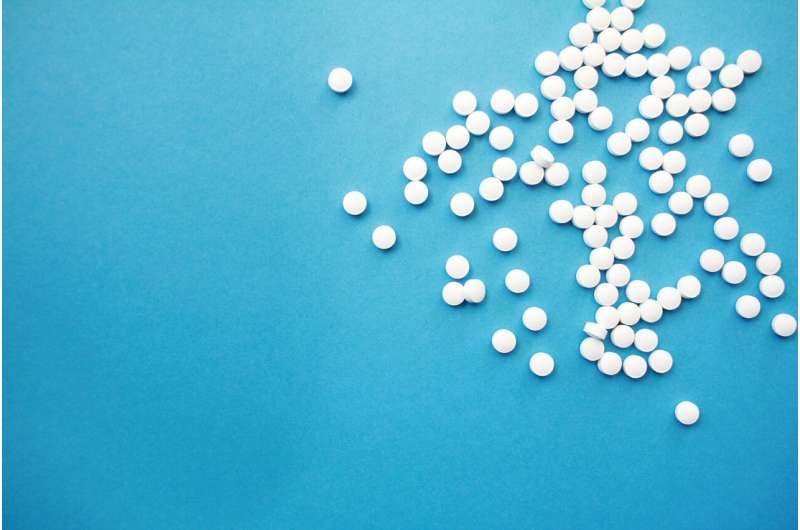Credit: Unsplash/CC0 Public Domain
P2Y12 inhibitor monotherapy lowers the risk of ischemic events compared with aspirin alone in patients with coronary artery disease without increasing bleeding risk, according to late breaking research presented in a Hot Line session on 29 August at ESC Congress 2022.
Professor Marco Valgimigli of the Cardiocentro Ticino Foundation, Lugano, Switzerland said, "The findings from our analysis, which included all available randomized evidence, challenge the central role of aspirin and support a paradigm shift toward single P2Y12 inhibition for secondary prevention in the long-term antithrombotic management of patients with coronary artery disease."
Long-term antiplatelet therapy with aspirin is a cornerstone of secondary prevention in patients with established atherosclerosis. Life-long aspirin is the standard of care after an initial course of dual antiplatelet therapy (DAPT) with a P2Y12 inhibitor plus aspirin in patients with an acute coronary syndrome or undergoing percutaneous coronary intervention. The CAPRIE randomized trial found a significant, yet mild, reduction of cardiovascular events with clopidogrel monotherapy compared with aspirin monotherapy in patients with coronary, cerebrovascular, and/or peripheral atherosclerosis. Studies comparing P2Y12 inhibitor monotherapy with clopidogrel or ticagrelor versus aspirin monotherapy have yielded mixed results.
PANTHER aimed to address this uncertainty with the most comprehensive individual participant data meta-analysis to date of randomized controlled trials evaluating the effect of monotherapy with currently recommended oral P2Y12 inhibitors (clopidogrel, prasugrel, or ticagrelor) versus aspirin on adjudicated ischemic and bleeding outcomes in patients with established coronary artery disease. The analysis included 24,325 patients from seven randomized controlled trials, of which 12,178 were assigned to P2Y12 inhibitor monotherapy (clopidogrel in 7,545 [62.0%], ticagrelor in 4,633 [38.0%]) and 12,147 were assigned to aspirin monotherapy. The median treatment duration was 557 days. The average age of participants was 64.3 years and 21.7% were women.
The risk of the primary efficacy outcome of cardiovascular death, myocardial infarction, and stroke was lower with P2Y12 inhibitor monotherapy compared with aspirin monotherapy (5.5% vs. 6.3%; hazard ratio [HR] 0.88; 95% confidence interval [CI] 0.79–0.97; p=0.014). The number needed to treat to prevent one adverse outcome was 123 patients.
Regarding secondary outcomes, the risk of major bleeding was similar between P2Y12 inhibition and aspirin (1.2% vs. 1.4%; HR 0.87; 95% CI 0.70–1.09; p=0.23). The risk of net adverse clinical events, defined as the composite of the primary efficacy endpoint and major bleeding, was reduced with P2Y12 inhibitor monotherapy compared with aspirin monotherapy (6.4% vs. 7.2%; HR 0.89; 95% CI 0.81–0.98; p=0.020), for a number needed to treat of 121 patients.
P2Y12 inhibitor monotherapy was associated with a lower risk of myocardial infarction compared with aspirin monotherapy (2.3% vs. 3.0%; HR 0.77; 95% CI 0.66–0.90; p<0.001). The number needed to treat to prevent one myocardial infarction with a P2Y12 inhibitor was 136 patients. There was evidence supporting a pronounced reduction in myocardial infarction with P2Y12 inhibitor monotherapy versus low-dose aspirin (HR 0.59; 95% CI 0.43–0.79) rather than high-dose aspirin (HR 0.85; 95% CI 0.71–1.01; p for interaction=0.040).
Professor Valgimigli said, "The relative risk of the primary composite endpoint was reduced by 12% in patients receiving a P2Y12 inhibitor, primarily driven by a 23% relative reduction of myocardial infarction and, secondarily, by numerically but not significantly lower rates of stroke. The overall risk of major bleeding did not differ, whereas gastrointestinal bleeding and hemorrhagic stroke occurred less frequently in patients receiving a P2Y12 inhibitor than aspirin monotherapy."
Provided by European Society of Cardiology






















